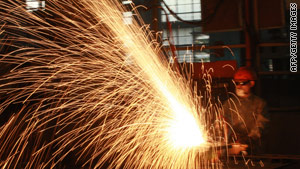China: Labor crunch in land of 1.3 billion

- An increasingly common sight in China's industrial south: "Help Wanted" signs.
- After layoffs in the wake of the financial crisis, manufacturers can't lure workers back
- Chinese workers now choosier in types of work and wages
Yiwu, China (CNN) -- There are 1.3 billion people in China, and millions upon millions live here in the nation's industrial south.
Yet an increasingly common sight in this manufacturing city are "Help Wanted" signs.
The southern industrial base of China was hardest hit by the economic crisis, forcing many factories to shut down or lay off workers. When business bounced back with Christmas-related orders, manufacturers such as Fang Bo had a new problem on his hands -- getting his workers back.
Bo said many workers -- often immigrants from rural areas -- left the city, never to return. Conversations with other factory managers tell a similar tale, with some forced to go into the hinterlands of China to attract workers back to their plants.
Manufacturers are trying to draw people such as laborer Chen Chang Yuan. Chen worked in construction in the northeastern Chinese city of Dalian for about four years. He's come to Yiwu to find a job in a factory because he thought it would pay big bucks.
He was not impressed with what he found.
"We have so many people here looking for jobs, but the recruiters offer so little money! Long working hours, low wages," he lamented at a city job center, as the crowds around us pressed in. "How can I survive?"
In other words, Chen believes there isn't a labor shortage but a mismatch in wages. He wants to be paid US$200 a month -- about 25 percent more than what most of the manufacturers at the job center are advertising.
And, interestingly, despite the global economic crisis, the workers here are finding it easier to hold out for better opportunities.
As the Chinese economy grows, the government's massive stimulus has created jobs not only in other parts of the country but in sectors outside of manufacturing, too. Laborers like Chen are become more selective about where they work.
Paul Cavey of Macquarie Economics Research says many Chinese job seekers are "spoilt for choice." He says companies in retail, construction, and real estate are hiring.
Government data shows unemployment in urban areas falling -- on track to meet the nation's target of 4.6 percent this year. Not everyone believes the official data accurately reflects the employment picture. However, most do believe joblessness is down.
Stanley Lau, the deputy chairman of the Federation of Hong Kong Industries says manufacturers will likely have to raise wages by at least "a few percentage points" in 2010. He thinks the tightness in the labor market will continue next year.
Managers at shirt company TAL Apparel say they have resorted to going personally to the villages to try to get workers to come back. Others like Tang's Decoration talk of upgrading their facilities -- adding Internet services or a basketball net -- to make their places more attractive. However, most are still reluctant to raise wages.
Winnie Tang, the owner of Tang's Decoration, said manufacturers are under tremendous pressure to keep costs down. Her customers -- retailers across the U.S., Europe, and Japan -- are demanding lower prices in the hopes of driving big Christmas sales during this down economy.
"If the customer is willing to pay us more, of course, we are willing to pay more to the workers," she said.
